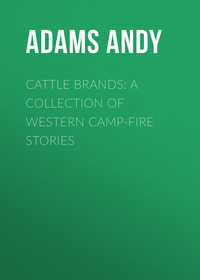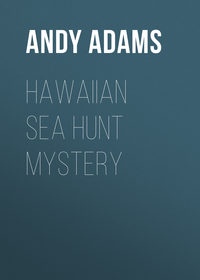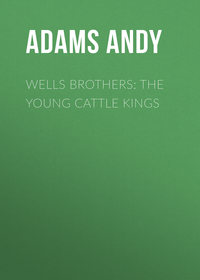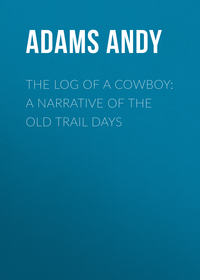 полная версия
полная версияThe Outlet
"Uncle Dave told this story so often that he actually believed it himself. But finally a wag friend of Colonel Andrews told of a dream which he had had about old Dave, which the latter hugely enjoyed. According to this second vagary, the old vagabond had also died and gone to heaven. There was some trouble at St. Peter's gate, as they refused to admit dogs, and Uncle Dave always had a troop of hounds at his heels. When he found that it was useless to argue the matter, he finally yielded the point and left the pack outside. Once inside the gate he stopped, bewildered at the scene before him. But after waiting inside some little time unnoticed, he turned and was on the point of asking the gate-keeper to let him out, when an angel approached and asked him to stay. There was some doubt in Dave's mind if he would like the place, but the messenger urged that he remain and at least look the city over. The old hunter goodnaturedly consented, and as they started up one of the golden streets Uncle Dave recognized an old friend who had once given him a hound pup. Excusing himself to the angel, he rushed over to his former earthly friend and greeted him with warmth and cordiality. The two old cronies talked and talked about the things below, and finally Uncle Dave asked if there was any hunting up there. The reply was disappointing.
"Meanwhile the angel kept urging Uncle Dave forward to salute the throne. But he loitered along, meeting former hunting acquaintances, and stopping with each for a social chat. When they finally neared the throne, the patience of the angel was nearly exhausted; and as old Dave looked up and saw Colonel Andrews occupying the throne, he rebelled and refused to salute, when the angel wrathfully led him back to the gate and kicked him out among his dogs."
Jack Splann told a yarn about the friendship of a pet lamb and dog which he owned when a boy. It was so unreasonable that he was interrupted on nearly every assertion. Long before he had finished, Sponsilier checked his narrative and informed him that if he insisted on doling out fiction he must have some consideration for his listeners, and at least tell it within reason. Splann stopped right there and refused to conclude his story, though no one but myself seemed to regret it. I had a true incident about a dog which I expected to tell, but the audience had become too critical, and I kept quiet. As it was evident that no more dog stories would be told, the conversation was allowed to drift at will. The recent shooting on the North Platte had been witnessed by nearly every one present, and was suggestive of other scenes.
"I have always contended," said Dorg Seay, "that the man who can control his temper always shoots the truest. You take one of these fellows that can smile and shoot at the same time—they are the boys that I want to stand in with. But speaking of losing the temper, did any of you ever see a woman real angry,—not merely cross, but the tigress in her raging and thirsting to tear you limb from limb? I did only once, but I have never forgotten the occasion. In supreme anger the only superior to this woman I ever witnessed was Captain Cartwright when he shot the slayer of his only son. He was as cool as a cucumber, as his only shot proved, but years afterward when he told me of the incident, he lost all control of himself, and fire flashed from his eyes like from the muzzle of a six-shooter. 'Dorg,' said he, unconsciously shaking me like a terrier does a rat, his blazing eyes not a foot from my face, 'Dorg, when I shot that cowardly – – — –, I didn't miss the centre of his forehead the width of my thumb nail.'
"But this woman defied a throng of men. Quite a few of the crowd had assisted the night before in lynching her husband, and this meeting occurred at the burying-ground the next afternoon. The woman's husband was a well-known horse-thief, a dissolute, dangerous character, and had been warned to leave the community. He lived in a little village, and after darkness the evening before, had crept up to a window and shot a man sitting at the supper-table with his family. The murderer had harbored a grudge against his victim, had made threats, and before he could escape, was caught red-handed with the freshly fired pistol in his hand. The evidence of guilt was beyond question, and a vigilance committee didn't waste any time in hanging him to the nearest tree.
"The burying took place the next afternoon. The murdered man was a popular citizen, and the village and country turned out to pay their last respects. But when the services were over, a number of us lingered behind, as it was understood that the slayer as well as his victim would be interred in the same grounds. A second grave had been prepared, and within an hour a wagon containing a woman, three small children, and several Mexicans drove up to the rear side of the inclosure. There was no mistaking the party, the coffin was carried in to the open grave, when every one present went over to offer friendly services. But as we neared the little group the woman picked up a shovel and charged on us like a tigress. I never saw such an expression of mingled anger and anguish in a human countenance as was pictured in that woman's face. We shrank from her as if she had been a lioness, and when at last she found her tongue, every word cut like a lash. Livid with rage, the spittle frothing from her mouth, she drove us away, saying:
"'Oh, you fiends of hell, when did I ask your help? Like the curs you are, you would lick up the blood of your victim! Had you been friends to me or mine, why did you not raise your voice in protest when they were strangling the life out of the father of my children? Away, you cowardly hounds! I've hired a few Mexicans to help me, and I want none of your sympathy in this hour. Was it your hand that cut him down from the tree this morning, and if it was not, why do I need you now? Is my shame not enough in your eyes but that you must taunt me further? Do my innocent children want to look upon the faces of those who robbed them of a father? If there is a spark of manhood left in one of you, show it by leaving me alone! And you other scum, never fear but that you will clutter hell in reward for last night's work. Begone, and leave me with my dead!'"
The circus had ended. The lateness of the hour was unobserved by any one until John Levering asked me if he should bring in my horse. It lacked less than half an hour until the guards should change, and it was high time our outfit was riding for camp. The innate modesty of my wrangler, in calling attention to the time, was not forgotten, but instead of permitting him to turn servant, I asked him to help our cook look after his utensils. On my return to the wagon, Parent was trying to quiet a nervous horse so as to allow him to carry the Dutch oven returning. But as Levering was in the act of handing up the heavy oven, one of Forrest's men, hoping to make the animal buck, attempted to place a briar stem under the horse's tail. Sponsilier detected the movement in time to stop it, and turning to the culprit, said: "None of that, my bully boy. I have no objection to killing a cheap cow-hand, but these cooks have won me, hands down. If ever I run across a girl who can make as good pies as we had for supper, she can win the affections of my young and trusting heart."
CHAPTER XVII. WATER-BOUND
Our route was carrying us to the eastward of the Black Hills. The regular trail to the Yellowstone and Montana points was by the way of the Powder River, through Wyoming; but as we were only grazing across to our destination, the most direct route was adopted. The first week after leaving the Niobrara was without incident, except the meeting with a band of Indians, who were gathering and drying the wild fruit in which the country abounded. At first sighting their camp we were uneasy, holding the herd close together; but as they proved friendly, we relaxed and shared our tobacco with the men. The women were nearly all of one stature, short, heavy, and repulsive in appearance, while the men were tall, splendid specimens of the aborigines, and as uniform in a dozen respects as the cattle we were driving. Communication was impossible, except by signs, but the chief had a letter of permission from the agent at Pine Ridge, allowing himself and band a month's absence from the reservation on a berrying expedition. The bucks rode with us for hours, silently absorbed in the beeves, and towards evening turned and galloped away for their encampment.
It must have been the latter part of July when we reached the South Fork of the Big Cheyenne River. The lead was first held by one and then the other herd, but on reaching that watercourse, we all found it more formidable than we expected. The stage of water was not only swimming, but where we struck it, the river had an abrupt cut-bank on one side or the other. Sponsilier happened to be in the lead, and Forrest and myself held back to await the decision of the veteran foreman. The river ran on a northwest angle where we encountered it, and Dave followed down it some distance looking for a crossing. The herds were only three or four miles apart, and assistance could have been rendered each other, but it was hardly to be expected that an older foreman would ask either advice or help from younger ones. Hence Quince and myself were in no hurry, nor did we intrude ourselves on David the pathfinder, but sought out a crossing up the river and on our course. A convenient riffle was soon found in the river which would admit the passage of the wagons without rafting, if a cut-bank on the south side could be overcome. There was an abrupt drop of about ten feet to the water level, and I argued that a wagon-way could be easily cut in the bank and the commissaries lowered to the river's edge with a rope to the rear axle. Forrest also favored the idea, and I was authorized to cross the wagons in case a suitable ford could be found for the cattle. My aversion to manual labor was quite pronounced, yet John Q. Forrest wheedled me into accepting the task of making a wagon-road. About a mile above the riffle, a dry wash cut a gash in the bluff bank on the opposite side, which promised the necessary passageway for the herds out of the river. The slope on the south side was gradual, affording an easy inlet to the water, the only danger being on the other bank, the dry wash not being over thirty feet wide. But we both agreed that by putting the cattle in well above the passageway, even if the current was swift, an easy and successful ford would result. Forrest volunteered to cross the cattle, and together we returned to the herds for dinner.
Quince allowed me one of his men besides the cook, and detailed Clay Zilligan to assist with the wagons. We took my remuda, the spades and axes, and started for the riffle. The commissaries had orders to follow up, and Forrest rode away with a supercilious air, as if the crossing of wagons was beneath the attention of a foreman of his standing. Several hours of hard work were spent with the implements at hand in cutting the wagon-way through the bank, after which my saddle horses were driven up and down; and when it was pronounced finished, it looked more like a beaver-slide than a roadway. But a strong stake was cut and driven into the ground, and a corral-rope taken from the axle to it; without detaching the teams, the wagons were eased down the incline and crossed in safety, the water not being over three feet deep in the shallows. I was elated over the ease and success of my task, when Zilligan called attention to the fact that the first herd had not yet crossed. The chosen ford was out of sight, but had the cattle been crossing, we could have easily seen them on the mesa opposite. "Well," said Clay, "the wagons are over, and what's more, all the mules in the three outfits couldn't bring one of them back up that cliff."
We mounted our horses, paying no attention to Zilligan's note of warning, and started up the river. But before we came in view of the ford, a great shouting reached our ears, and giving our horses the rowel, we rounded a bend, only to be confronted with the river full of cattle which had missed the passageway out on the farther side. A glance at the situation revealed a dangerous predicament, as the swift water and the contour of the river held the animals on the farther side or under the cut-bank. In numerous places there was footing on the narrow ledges to which the beeves clung like shipwrecked sailors, constantly crowding each other off into the current and being carried downstream hundreds of yards before again catching a foothold. Above and below the chosen ford, the river made a long gradual bend, the current and deepest water naturally hugged the opposite shore, and it was impossible for the cattle to turn back, though the swimming water was not over forty yards wide. As we dashed up, the outfit succeeded in cutting the train of cattle and turning them back, though fully five hundred were in the river, while not over one fifth that number had crossed in safety. Forrest was as cool as could be expected, and exercised an elegant command of profanity in issuing his orders.
"I did allow for the swiftness of the current," said he, in reply to a criticism of mine, "but those old beeves just drifted downstream like a lot of big tubs. The horses swam it easy, and the first hundred cattle struck the mouth of the wash square in the eye, but after that they misunderstood it for a bath instead of a ford. Oh, well, it's live and learn, die and forget it. But since you're so d– strong on the sabe, suppose you suggest a way of getting those beeves out of the river."
It was impossible to bring them back, and the only alternative was attempted. About three quarters of a mile down the river the cut-bank shifted to the south side. If the cattle could swim that distance there was an easy landing below. The beeves belonged to Forrest's herd, and I declined the proffered leadership, but plans were outlined and we started the work of rescue. Only a few men were left to look after the main herds, the remainder of us swimming the river on our horses. One man was detailed to drive the contingent which had safely forded, down to the point where the bluff bank shifted and the incline commenced on the north shore. The cattle were clinging, in small bunches, under the cut-bank like swallows to a roof for fully a quarter-mile below the mouth of the dry wash. Divesting ourselves of all clothing, a squad of six of us, by way of experiment, dropped over the bank and pushed into the river about twenty of the lowest cattle. On catching the full force of the current, which ran like a mill-race, we swept downstream at a rapid pace, sometimes clinging to a beef's tail, but generally swimming between the cattle and the bluff. The force of the stream drove them against the bank repeatedly, but we dashed water in their eyes and pushed them off again and again, and finally landed every steer.
The Big Cheyenne was a mountain stream, having numerous tributaries heading in the Black Hills. The water was none too warm, and when we came out the air chilled us; but we scaled the bluff and raced back after more cattle. Forrest was in the river on our return, but I ordered his wrangler to drive all the horses under saddle down to the landing, in order that the men could have mounts for returning. This expedited matters, and the work progressed more rapidly. Four separate squads were drifting the cattle, but in the third contingent we cut off too many beeves and came near drowning two fine ones. The animals in question were large and strong, but had stood for nearly an hour on a slippery ledge, frequently being crowded into the water, and were on the verge of collapse from nervous exhaustion. They were trembling like leaves when we pushed them off. Runt Pickett was detailed to look especially after those two, and the little rascal nursed and toyed and played with them like a circus rider. They struggled constantly for the inshore, but Runt rode their rumps alternately, the displacement lifting their heads out of the water to good advantage. When we finally landed, the two big fellows staggered out of the river and dropped down through sheer weakness, a thing which I had never seen before except in wild horses.
A number of the boys were attacked by chills, and towards evening had to be excused for fear of cramps. By six o'clock we were reduced to two squads, with about fifty cattle still remaining in the river. Forrest and I had quit the water after the fourth trip; but Quince had a man named De Manse, a Frenchman, who swam like a wharf-rat and who stayed to the finish, while I turned my crew over to Runt Pickett. The latter was raised on the coast of Texas, and when a mere boy could swim all day, with or without occasion. Dividing the remaining beeves as near equally as possible, Runt's squad pushed off slightly in advance of De Manse, the remainder of us riding along the bank with the horses and clothing, and cheering our respective crews. The Frenchman was but a moment later in taking the water, and as pretty and thrilling a race as I ever witnessed was in progress. The latter practiced a trick, when catching a favorable current, of dipping the rump of a steer, thus lifting his fore parts and rocking him forward like a porpoise. When a beef dropped to the rear, this process was resorted to, and De Manse promised to overtake Pickett. From our position on the bank, we shouted to Runt to dip his drag cattle in swift water; but amid the din and splash of the struggling swimmers our messages failed to reach his ears. De Manse was gaining slowly, when Pickett's bunch were driven inshore, a number of them catching a footing, and before they could be again pushed off, the Frenchman's cattle were at their heels. A number of De Manse's men were swimming shoreward of their charges, and succeeded in holding their beeves off the ledge, which was the last one before the landing. The remaining hundred yards was eddy water; and though Pickett fought hard, swimming among the Frenchman's lead cattle, to hold the two bunches separate, they mixed in the river. As an evidence of victory, however, when the cattle struck a foothold, Runt and each of his men mounted a beef and rode out of the water some distance. As the steers recovered and attempted to dislodge their riders, they nimbly sprang from their backs and hustled themselves into their ragged clothing.
I breathed easier after the last cattle landed, though Forrest contended there was never any danger. At least a serious predicament had been blundered into and handled, as was shown by subsequent events. At noon that day, rumblings of thunder were heard in the Black Hills country to the west, a warning to get across the river as soon as possible. So the situation at the close of the day was not a very encouraging one to either Forrest or myself. The former had his cattle split in two bunches, while I had my wagon and remuda on the other side of the river from my herd. But the emergency must be met. I sent a messenger after our wagon, it was brought back near the river, and a hasty supper was ordered. Two of my boys were sent up to the dry wash to recross the river and drift our cattle down somewhere near the wagon-crossing, thus separating the herds for the night. I have never made claim to being overbright, but that evening I did have sense or intuition enough to take our saddle horses back across the river. My few years of trail life had taught me the importance of keeping in close touch with our base of subsistence, while the cattle and the saddle stock for handling them should under no circumstances ever be separated. Yet under existing conditions it was impossible to recross our commissary, and darkness fell upon us encamped on the south side of the Big Cheyenne.
The night passed with almost constant thunder and lightning in the west. At daybreak heavy dark clouds hung low in a semicircle all around the northwest, threatening falling weather, and hasty preparations were made to move down the stream in search of a crossing. In fording the river to breakfast, my outfit agreed that there had been no perceptible change in the stage of water overnight, which quickened our desire to move at once. The two wagons were camped close together, and as usual Forrest was indifferent and unconcerned over the threatening weather; he had left his remuda all night on the north side of the river, and had actually turned loose the rescued contingent of cattle. I did not mince my words in giving Mr. Forrest my programme, when he turned on me, saying: "Quirk, you have more trouble than a married woman. What do I care if it is raining in London or the Black Hills either? Let her rain; our sugar and salt are both covered, and we can lend you some if yours gets wet. But you go right ahead and follow up Sponsilier; he may not find a crossing this side of the Belle Fourche. I can take spades and axes, and in two hours' time cut down and widen that wagon-way until the herds can cross. I wouldn't be as fidgety as you are for a large farm. You ought to take something for your nerves."
I had a mental picture of John Quincy Forrest doing any manual labor with an axe or spade. During our short acquaintance that had been put to the test too often to admit of question; but I encouraged him to fly right at the bank, assuring him that in case his tools became heated, there was always water at hand to cool them. The wrangler had rustled in the wagon-mules for our cook, and Forrest was still ridiculing my anxiety to move, when a fusillade of shots was heard across and up the river. Every man at both wagons was on his feet in an instant, not one of us even dreaming that the firing of the boys on herd was a warning, when Quince's horsewrangler galloped up and announced a flood-wave coming down the river. A rush was made for our horses, and we struck for the ford, dashing through the shallows and up the farther bank without drawing rein. With a steady rush, a body of water, less than a mile distant, greeted our vision, looking like the falls of some river, rolling forward like an immense cylinder. We sat our horses in bewilderment of the scene, though I had often heard Jim Flood describe the sudden rise of streams which had mountain tributaries. Forrest and his men crossed behind us, leaving but the cooks and a horse-wrangler on the farther side. It was easily to be seen that all the lowlands along the river would be inundated, so I sent Levering back with orders to hook up the team and strike for tall timber. Following suit, Forrest sent two men to rout the contingent of cattle out of a bend which was nearly a mile below the wagons. The wave, apparently ten to twelve feet high, moved forward slowly, great walls lopping off on the side and flooding out over the bottoms, while on the farther shore every cranny and arroyo claimed its fill from the avalanche of water. The cattle on the south side were safe, grazing well back on the uplands, so we gave the oncoming flood our undivided attention. It was traveling at the rate of eight to ten miles an hour, not at a steady pace, but sometimes almost halting when the bottoms absorbed its volume, only to catch its breath and forge ahead again in angry impetuosity. As the water passed us on the bluff bank, several waves broke over and washed around our horses' feet, filling the wagon-way, but the main volume rolled across the narrow valley on the opposite side. The wagons had pulled out to higher ground, and while every eye was strained, watching for the rescued beeves to come out of the bend below, Vick Wolf, who happened to look upstream, uttered a single shout of warning and dashed away. Turning in our saddles, we saw within five hundred feet of us a second wave about half the height of the first one. Rowels and quirts were plied with energy and will, as we tore down the river-bank, making a gradual circle until the second bottoms were reached, outriding the flood by a close margin.
The situation was anything but encouraging, as days might elapse before the water would fall. But our hopes revived as we saw the contingent of about six hundred beeves stampede out of a bend below and across the river, followed by two men who were energetically burning powder and flaunting slickers in their rear. Within a quarter of an hour, a halfmile of roaring, raging torrent, filled with floating driftwood, separated us from the wagons which contained the staples of life. But in the midst of the travail of mountain and plain, the dry humor of the men was irrepressible, one of Forrest's own boys asking him if he felt any uneasiness now about his salt and sugar.








